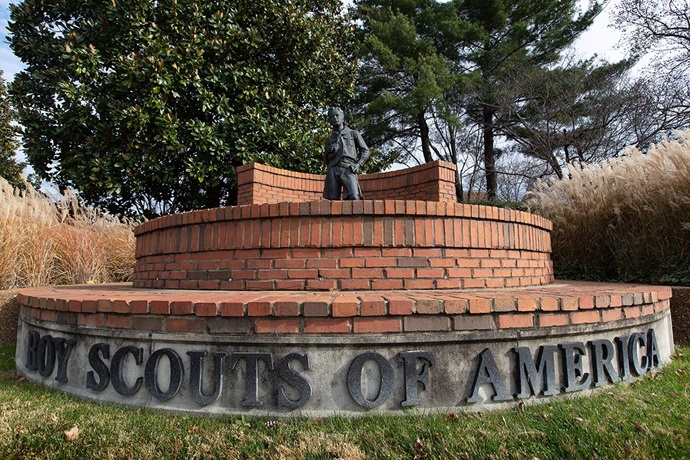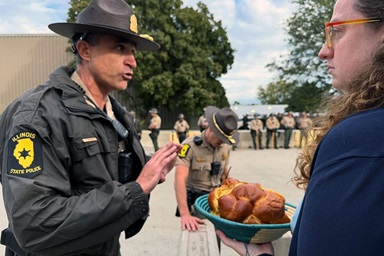Key points
- A federal bankruptcy court judge approved parts of a Boy Scouts of America reorganization plan, including a $30 million United Methodist contribution to a fund for survivors of Scouting-related sex abuse.
- Though issues remain, United Methodist leaders are cautiously optimistic that the BSA will survive.
- United Methodist leaders reiterated their commitment to having local churches partner with the BSA and help Scouting grow.
United Methodist leaders greeted with cautious optimism a judge’s partial approval of the Boy Scouts of America’s bankruptcy reorganization plan.
The BSA filed for bankruptcy in February 2020 amid mounting claims of Scouting-related sex abuse going back decades, with many allegations involving chartering or sponsoring organizations of Scout troops, including local United Methodist churches.
After months of negotiations and hearings involving multiple parties, as well as a trial earlier this year, U.S. Bankruptcy Court Judge Laurie Selber Silverstein issued a lengthy ruling on July 29, approving initial settlements of about $2.3 billion to abuse survivors. That includes a $30 million United Methodist contribution to the survivors’ fund.
Silverstein rejected some parts of the bankruptcy plan, saying the BSA still has “decisions to make” as it continues a fight for survival, but expressed her willingness to work with the organization.
Scouting ministry continues
United Methodist leaders and the BSA plan to continue as partners but in a new relationship that includes a new, standard affiliation agreement for local churches wanting to host a Scouting group.
See agreement.
United Methodist Bishop John Schol is among a group of United Methodist leaders who has negotiated on behalf of the denomination.
“I am grateful Judge Silverstein ruled that most of the BSA reorganization plan met with criteria of bankruptcy law and was constitutional, including approving the United Methodist settlement,” Schol said in an email to UM News. “However, there are several more matters the BSA must address in order for the plan’s full approval.”
Steven Scheid, director of the Center for Scouting Ministries at United Methodist Men, said that though hurdles remain, he sees “God actively preparing a future” for the BSA.
In its own statement, the BSA said: “This ruling represents a significant milestone in the financial restructuring of the Boy Scouts of America. … We are committed to working with all constituents to make the necessary changes required by the ruling to drive this process forward and we remain optimistic about securing approval of a final plan as soon as possible.”
The United Methodist Church and its predecessor denominations have had a relationship with the BSA for more than 100 years, mainly by providing headquarters for Scouting groups at local churches.
Some 6,600 Scouting units were chartered by United Methodist churches in the U.S. as of May, making the denomination the largest partner of BSA programs.
But local United Methodist churches — which in many cases recruited and screened adult leaders of Scouting groups — have faced considerable liability in that partnership. That became even clearer as Scouting-related abuse allegations mounted and prompted the bankruptcy filing.
United Methodist leaders formed a committee to represent the denomination in the bankruptcy negotiations — something other large partner groups did as well.
The committee ultimately negotiated a settlement for United Methodist conferences in the U.S. to contribute $30 millionto a fund for abuse survivors. United Methodist local churches would in turn get protection from future lawsuits over Scouting-related abuse allegations.
The settlement also committed the denomination to a review of all Safe Sanctuary policies in conferences and local churches; to meeting with survivors of abuse that occurred in United Methodist-sponsored troops; and to sharing resources across the denomination about the reality of sexual abuse and ways to keep young people safe.
In her ruling, Silverstein noted that there had been no objection to The United Methodist Church settlement, and that she found “substantial” its monetary contribution and willingness to work with survivors. She also said the denomination’s commitment to continue working with BSA “helps to ensure … the future of Scouting.”
Subscribe to our
e-newsletter
In June, United Methodist leaders and the BSA announced they would continue as partners but in a new relationship that would include a standard affiliation agreement for local churches wanting to host a Scouting group.
Churches will be supportive of Scouting in various ways, but supervisory responsibility will shift to local Boy Scout Councils.
Along with approving the $30 million United Methodist contribution to the survivors’ fund, Silverstein approved $78 million from the BSA, $515 million from local Scouting councils and nearly $1.7 billion from settling insurers.
The judge did not approve a proposed $250 million settlement by the Church of Jesus Christ of Latter-day Saints — a major sponsoring organization in years past. She expressed concern about the settlement’s effort to protect against liability for non-Scouting abuse.
The Associated Press has covered the bankruptcy proceedings closely and noted that the BSA, upon filing for bankruptcy, faced about 275 lawsuits and knew of another 1,400 potential cases. There are now more than 82,000 claims.
The Coalition of Abused Scouts for Justice — which includes law firms representing more than 70,000 of the survivor claimants — noted the scope and complexity of the litigation. The coalition offered a positive assessment of Silverstein’s ruling.
“The confirmation of this plan makes closure possible and some measure of justice tangible for people whose voices have been silenced for far too long,” the group said in a statement.
Schol, in a press release, joined in looking forward to a final agreement.
“I am confident that everyone working together with the BSA will be able to address the remaining issues so that survivors will be fairly compensated and 1 million young people will continue to participate in Scouting.”
Hodges is a Dallas-based writer for United Methodist News. Contact him at 615-742-5470 or [email protected]. To read more United Methodist news, subscribe to the free Daily or Weekly Digests.




